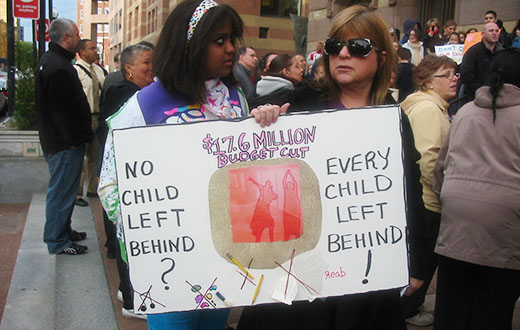
In December, I watched “Mr Holland’s Opus” on cable. In this 1995 movie, a young composer takes a temporary job as a high school music teacher. He stays for 35 years, but in the economic crisis of the early 1990’s, the music program falls victim to budget cuts, and Mr. Holland is laid off. Leaving the school for the last time, he is surprised by a farewell tribute concert in which three decades of former students, including the state governor, give a performance and testify to the difference Mr. Holland made in their lives. The movie’s feel-good ending masks the grim reality — the governor saluted Mr. Holland, but she did not reverse the budget cuts, and future students would be denied the benefit of learning from Mr. Holland and, presumably, the other music, art and other teachers laid off across the state.
Almost every state is now facing a budgetary storm that makes Mr. Holland’s time look like a spring shower. Already, thousands of teachers, nurses, librarians, and other public workers have been laid off, with state and local government employment falling by 377,000 in the last 2 years. In the coming year, states face a combined shortfall likely to exceed $112 billion. Business, Wall Street and much of the media are unanimous in their solution: Cut, baby, cut. But budget cuts come at a terrible human price in unemployment and lost services. There is also a cost in education, public health and infrastructure that undermine the future economic potential of our state. It will be Mr Holland multiplied by millions.
Federal stimulus money helped to balance state budgets the last two years, but Congress allowed that program to expire. At the same time, Congress has extended tax cuts that allow wealthy Americans to avoid at least $80 billion per year in taxes. So, says New York City Councilman Brad Ladner, “It is time for cities and states to step up. That’s why the New York City Council’s Progressive Caucus, which I co-chair, has introduced a plan to place a temporary city/state income tax surcharge on the wealthiest New Yorkers-precisely the amount of the tax windfall they are getting [from the December tax deal in Congress].”3
Brilliant! My state of Connecticut is facing a budget deficit of at least $3.5 billion for the year beginning July 2011. A temporary state income tax surcharge on residents with incomes over $250,000 to balance the windfall they got from Congress, would increase revenue by more than $3.5 billion in the coming year to completely close the state’s revenue gap.
But aren’t state deficits caused by runaway spending? The short answer is, “No.” As a New York Times editorial explained, “The most immediate cause of the states’ problems is the decline in tax revenue caused by the downturn, just as the demand for services has increased.” The economic crisis and high unemployment have meant a drop of 12% in state revenue since the start of the recession.When states cuts spending, they lose jobs, local businesses lose customers, and towns lose tax revenue. State and local cutbacks make the economic crisis worse.
Even while reducing revenue, the recession has increased costs by putting pressure on government services. Medicaid enrollment alone increased 13.6% 2007 to 2009.. Other services, from unemployment offices to school lunches to homeless shelters to community colleges, have seen increased demand. This will accelerate as millions of jobless exhaust their final unemployment insurance payments in the next few months.
Are deficits caused by greedy government workers? Again, the facts say, “No.” Recent studies have shown that government workers earn less than private sector workers of comparable education and responsibilities. This is true even when the health, pension and other benefits of government workers are taken into account. And in many states. workers have already given up hundreds of millions in pay and benefit concessions.
The best solution to state’s budget woes would come at a national level, including a new stimulus package that would increase support for state and local governments during this crisis. The measure could be financed by cutting military spending and by taxes on Wall Street speculation and higher income tax rates on the richest 2% who have done so well, solutions approved by an 81% majority in a recent poll.
While citizens and elected officials should keep the pressure on Washington, our state and local governments have to make hard decisions today. The New York Times, in its Dec. 26 editorial, went on to say, “Many governors claim tax increases are ill-advised during a recession, but more experienced economists say it is better to raise taxes on the rich than to lay off workers and cut spending… The federal government missed a chance to begin to act rationally about its long-term deficit by giving away the store to the rich in the tax deal. States should not make the same mistake.”
States around the country should take up the New York City proposal — increase local taxes on the rich to make up for the windfall they just got in December’s tax deal. Even then, millionaires would be paying far lower taxes than in the 1950s and 1960s, a time of economic growth, reducing poverty, and rising living standards for working families.












Comments